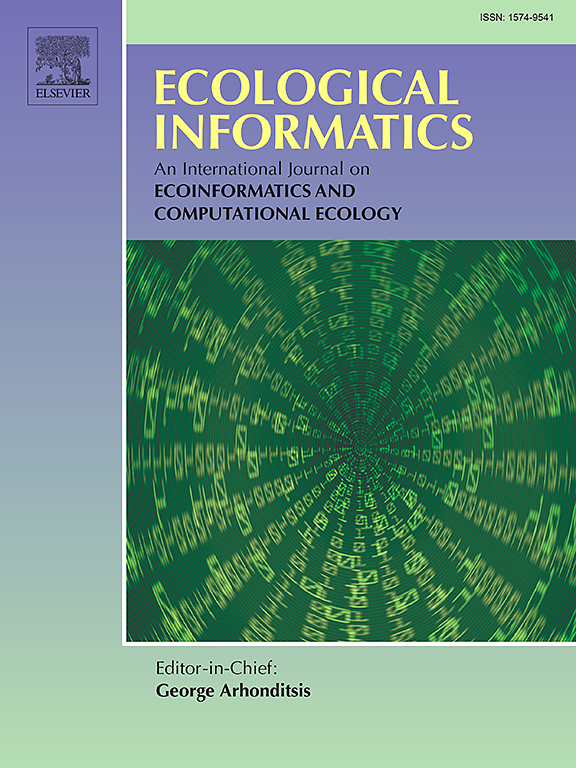MRSEILA:一种利用局部适应性增强生态环境质量评价的改进遥感生态指数
IF 7.3
2区 环境科学与生态学
Q1 ECOLOGY
引用次数: 0
摘要
遥感生态指数(RSEI)通过综合多种环境因子,在生态环境质量评价中得到了广泛的应用。为了增强RSEI捕捉当地生态变化的能力,我们设计了一个本地适应版本(RSEILA),并使用移动窗口广泛采用。然而,主成分分析(PCA)产生的特征向量方向的随机性会引入偏差,影响RSEILA评估的准确性。为了提高RSEILA在EEQ中的有效性,我们提出了一种改进的RSEILA模型(MRSEILA),该模型在谷歌Earth Engine (GEE)平台上实现,由三个部分组成:(1)针对每个目标区域的移动窗口大小进行优化;(2) pca诱导特征向量方向不一致的自动识别与校正;(3)改进各圆窗内PCA计算,提高EEQ评价的准确性。我们使用Landsat Collection 2 Level-2地表反射率数据验证了MRSEILA,并将其与RSEILA在中国四个典型地区的性能进行了比较。结果表明,与RSEILA相比,MRSEILA的特征向量方向一致,EEQ评价更准确,能更好地反映四个试验区的实际地表状况,是区域和大规模生态监测的有效工具。本文章由计算机程序翻译,如有差异,请以英文原文为准。
MRSEILA: A modified remote sensing ecological index using local adaptability for enhancing ecological environment quality assessment
The Remote Sensing Ecological Index (RSEI) has been widely applied in ecological environment quality (EEQ) assessments by integrating multiple environmental factors. To enhance RSEI's ability to capture local ecological variations, a locally adapted version (RSEILA) was designed and widely adopted using moving windows. However, the randomness in eigenvector directions generated by principal component analysis (PCA) can introduce bias, affecting the accuracy of RSEILA's assessment. To enhance the effectiveness of RSEILA in EEQ, we propose a modified RSEILA model (MRSEILA) implemented on the Google Earth Engine (GEE) platform, consisting of three components: (1) optimization of moving window sizes tailored to each target region; (2) automatic recognition and correction of PCA-induced eigenvector direction inconsistencies; and (3) refinement of PCA computation within each circular window to improve the accuracy of EEQ evaluations. We validated MRSEILA using Landsat Collection 2 Level-2 surface reflectance data and compared its performance with RSEILA across four typical areas in China. The results showed that, compared to RSEILA, MRSEILA consistently produces aligned eigenvector directions and more accurate EEQ assessments that better reflect actual land surface conditions across all four testing areas, making it an effective tool for regional and large-scale ecological monitoring.
求助全文
通过发布文献求助,成功后即可免费获取论文全文。
去求助
来源期刊

Ecological Informatics
环境科学-生态学
CiteScore
8.30
自引率
11.80%
发文量
346
审稿时长
46 days
期刊介绍:
The journal Ecological Informatics is devoted to the publication of high quality, peer-reviewed articles on all aspects of computational ecology, data science and biogeography. The scope of the journal takes into account the data-intensive nature of ecology, the growing capacity of information technology to access, harness and leverage complex data as well as the critical need for informing sustainable management in view of global environmental and climate change.
The nature of the journal is interdisciplinary at the crossover between ecology and informatics. It focuses on novel concepts and techniques for image- and genome-based monitoring and interpretation, sensor- and multimedia-based data acquisition, internet-based data archiving and sharing, data assimilation, modelling and prediction of ecological data.
 求助内容:
求助内容: 应助结果提醒方式:
应助结果提醒方式:


